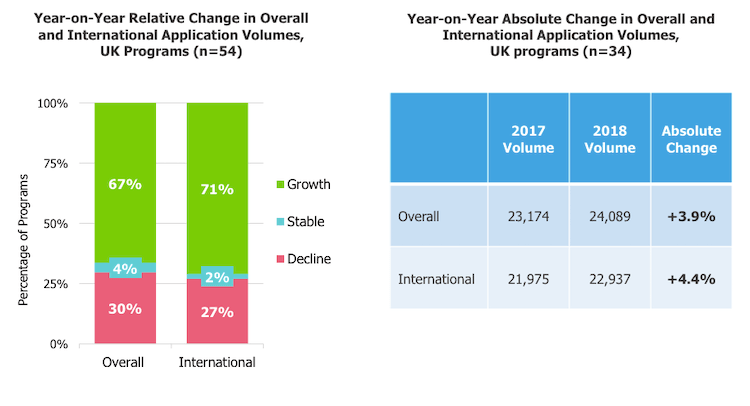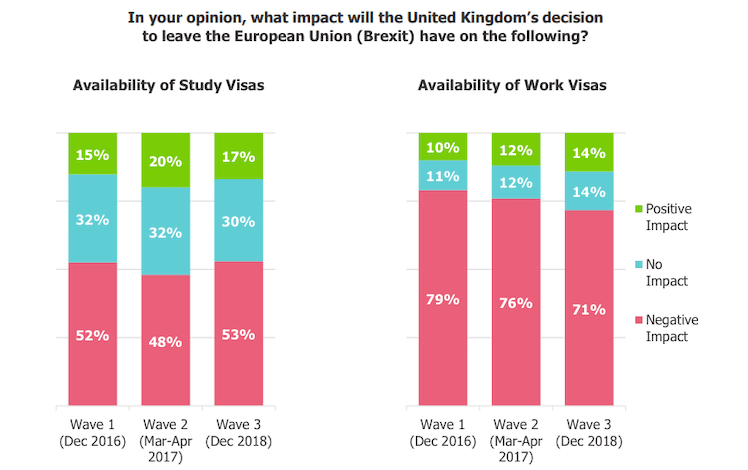What is the Impact of Brexit on UK Business Schools?

Deal! No Deal! Backstop! Referendum! The Brexit debacle is dominating political discourse in the United Kingdom.
The UK government is now asking for an extension to Article 50, the clause which triggers the UK’s withdrawal. The future for the UK remains just as uncertain as it was on the date of the EU Referendum in June 2016.
Since then, the Graduate Management Admission Council (GMAC) has been tracking the attractiveness of the UK as a study destination through three surveys ("waves") of over 1,000 prospective graduate business school—MBA and master’s—students in total, conducted between December 2016 and 2018.
Here are the results:
The good
It’s feared Brexit could complicate visa processes, negatively impact the UK economy, and reduce job opportunities for business school students in the UK.
Yet, according to GMAC, the number of candidates applying to UK business schools, who chose the UK as their first-choice country, has increased.
In December 2018’s survey, 54 percent of respondents said Brexit had no impact on their decision to study in the UK, up from 46 percent in 2016. Prospective students are attracted by the reputation of the UK educational system and the potential to develop an international network and career.
In fact, UK business schools remain just as popular a choice for prospective students today as they were before the EU Referendum. According to GMAC’s Application Trends Survey, 71 percent of UK-based graduate business programs reported a growth in international applications in 2018, up 4.4 percent from 2017.

The bad
However, the continued uncertainty around Brexit is taking its toll. One in two non-UK Europeans said they were less likely to study in the UK because of Brexit.
Very few business school candidates see Brexit as a good thing—most consider Brexit as a detriment to the availability of student and work visas in the UK. Candidates also fear Brexit will negatively impact the cost of education and living in the UK.

In a Brexit survey conducted by BusinessBecause in 2018, 45 percent of respondents listed Brexit as one of the biggest concerns they had about studying in the UK. If you turn GMAC’s December 2018 data on its head, that’s still 46 percent of respondents who are bothered by Brexit.
The UK’s popularity has also likely been sustained by a falling pound—making UK MBA and master’s programs cheaper—and reduced interest in the United States, which has seen international applications suffer—a trend commentators blame both on visa issues and the anti-immigration policies of Donald Trump.
Is Brexit making UK business schools less attractive?
Is interest in UK schools waning because of Brexit? According to GMAC’s application data, no—not yet—but it isn’t helping. The popularity of UK business schools persists despite Brexit; not because of it.
The business schools we spoke to below—Oxford Saïd, Imperial, LBS, Exeter, and Warwick Business School—all paint a positive picture. Yet elsewhere there are concerning trends. New analysis by professional recruitment firm Robert Walters shows financial services recruitment increased in 2018 in Dublin, Frankfurt, and Paris, more strongly than in London.
The effect of Brexit on UK business schools also depends on the profile of the school. Speaking to BusinessBecause last year, the University of Leicester School of Management reported that applications from EU students and staff had dropped significantly.
Sangeet Chowfla, GMAC president and CEO, says: “If we are to maintain a healthy climate for aspiring candidates, we need to make it possible for people from different regions and backgrounds to study and work in the location they desire.”
How is Brexit affecting these top UK business schools?
Saïd Business School, University of Oxford
Peter Tufano, Peter Moores dean and professor of finance
Much will change in Britain and in Europe in the wake of the UK’s exit from the EU. We don’t truly know what a No-Deal Brexit would mean, but expect that it could involve delays in obtaining visas and slowed shipments of goods. Like others, we are making some contingency plans.
Despite this, I remain optimistic. Brexit, to date, has not had a discernible impact on our activities. Our MBA applications have continued to grow and we continue to recruit faculty from Europe and beyond.
Over 800 years, Oxford has weathered civil wars, world wars, and religious conflicts. It has witnessed massive changes in science, medicine, technology, the structure of government and more. With disruption comes opportunity for those with vision, especially for business students who can capitalize on being embedded in this global institution.
Imperial College Business School
Leila Guerra, associate dean of programs
We’ve seen a 38 percent increase in applications for both our MBA and master’s programs since before the referendum vote. We’ve seen a steady rise in applications from EU students, with a 68 percent increase in applications for our MBA programs, while our master’s degrees have also seen a 36 percent increase in numbers.
This shows us that Imperial, as a London based business school, remains an attractive place to study, and Brexit alone will not diminish London’s position as a key capital for opportunity. The city will still retain a "wow-factor" for students.
London Business School
Gareth Howells, executive director, MBA
Overall, our MBA applications are up, more women than ever are applying and, interestingly, we have even seen a modest increase in the number of students getting jobs in the UK upon graduation. This data suggests that the UK is still an attractive study destination and the idea that everyone who comes to the UK to study wants to work here is a myth.
None of this denies however the very important issues at stake. Visa regimes, for example, that support highly skilled talent and the enormous contribution that makes to the world economy in the UK and beyond, are critical. As a business school, we, like business, continue to follow developments closely and make our voice heard.
University of Exeter Business School
Stuart Robinson, associate dean of professional education
To date, we have not experienced any major impacts on either our student recruitment or operations generally. More than three quarters of our students come from outside the EU and while Brexit is something people are aware of, it does not appear to be having a negative or positive effect. People are primarily focussed on whether a program or course of study is right for them and Brexit does not appear to be a major driver when considering where to study.
I think [the prospect of] No Deal is very concerning. The chief areas of concern are around recruitment of EU faculty and staff, and the drying up of involvement in, and funding from, EU-wide research partnerships and initiatives.
Irrespective of the concerns over Brexit, we are privileged that the global reputation of UK business schools is so good. As an industry, we need to work hard to maintain this reputation, whatever the results of Brexit end up being.
Warwick Business School
Dean Andrew Lockett
Brexit was not something we wanted. Having said that, we have seen a steady rise in application numbers since the referendum and we are double-streaming our full-time MBA this academic year for the first time to cope with increased demand. This rise in applications includes a 51 percent increase in applications from the EU for all our MBA courses since 2017.
Brexit will pose challenges that will need to be overcome and we will have to monitor issues closely, including those around visas and research grants from the EU, as they are discussed and negotiated.
The main effect [of a No Deal] will be uncertainty. The University of Warwick along with Universities UK has been talking to the Government about putting measures in place. We are confident that the stability measures put in place by the Government—around Erasmus, research funding, and the European Temporary Leave To Remain process for students from the EU—mean the application process for EU students will remain robust.
We’ll also continue to seek out new and innovative solutions to mitigate the risks and the establishment of strategic collaborations with European partners such as Paris Seine and VUB in Belgium is one such innovation.
This article was originally published on BusinessBecause.
Whether you’re considering an MBA, EMBA, or Master’s program, read more content like this and get practical resources to help your business school application on BusinessBecause.




